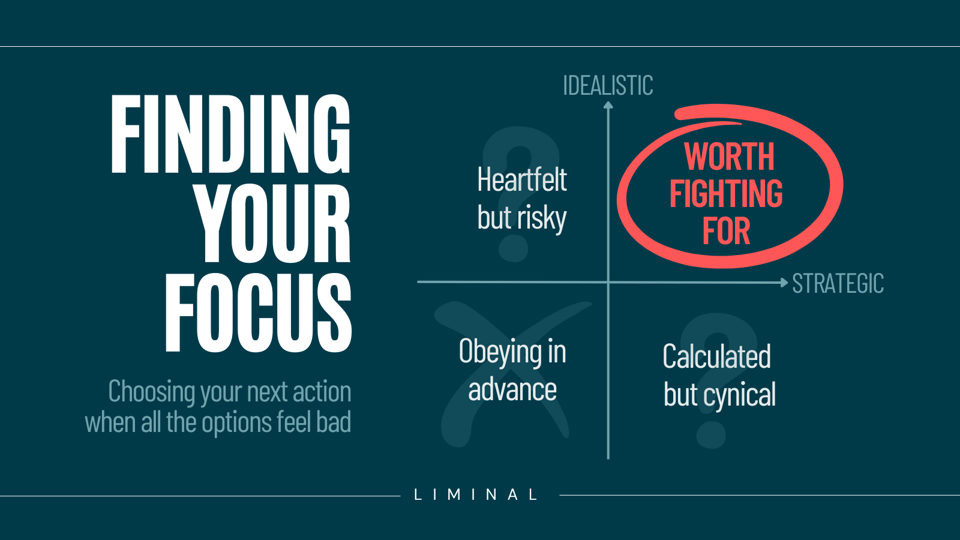Week 3
Figuring out what to focus on now & what to focus on next in science and higher ed
This newsletter is my part of an ongoing conversation among colleagues who’ve had a rough week. I share two or three pieces of the puzzle that feel are most important, hazard a guess about what to expect next, and offer at least one useful thing to do.
MEETING THE MOMENT: 2025-02-07
Hi friends,
Well… this was week 3. Our ongoing challenge and commitment is to stay focused, instead of flooded. By that, I don’t mean “Never lose focus!” - of course we will be shaken by the grotesquerie of the week. What matters is consistently recovering and refocusing.1 So let’s give that a go.
What’s happening now:
NIH: I was shocked by the announcement late in the day that NIH indirects will be slashed to 15% (yes, you read that right).2 If this does happen, it will ravage the research ecosystem. We need good explainers of indirects, but beware of getting so bogged down in explaining the intricacies of a funding model that you miss the big picture. Universities are some of the biggest employers and hospital systems in every part of the country: strangling them just rips good jobs and medical care away from regular people everywhere.
USAID: I touched on this last week, but the ramifications of dismantling American foreign aid and development assistance are truly devastating abroad and at home. So many people are going to die, so many more are going to suffer, and many of them are children. We must center that, but should also talk about the chaos on the procedural side. Agency staff are getting yanked out of their posts and as many as ten thousand have been threatened with lay offs. Two federal employee unions are suing to block the firings and restore funding, and a judge has just issued a partial, temporary block. Two things for us to think about together:
1) the gross mismatch in speed of actions vs. litigation-based reactions3, and
2) the mind-boggling work of tracking lawsuits and court decisions. Fortunately, we don’t have to do it ourselves, and we don’t have to do it alone. We’re just starting to wrap our heads around the incredible work that law schools and libraries are doing to track everything.4 (More on this theme in the wrap up.)
And other losses: Watching agencies scrubbing language and deleting websites has been terrible.5 But witnessing philanthropies like HHMI voluntarily choose to gut critical funding is devastating. The idea of institutional betrayal is helping me, as is learning about the specific nature of perceived threats (like taxing endowments of private universities and stripping nonprofit status).
What’s next:
Honestly, I wrote and then deleted some thoughts about the next possible actions from OMB and the March 14 budget deadline. Instead I’m going to take a deep breath and ask you to join me on focusing instead on what to do right now.
What to do:
“Start where you are. Use what you have. Do what you can.”6
Maybe you’ve got data or programming skills. Good. There are amazing data rescue efforts underway. Throw your weight behind them.
Look to see if your professional society has a call to action: do it, share it, push for more.
Figure out who is engaged in the kinds of actions that speak to you. Whether it’s local unions, specific advocacy groups, or big organizations like Union of Concerned Scientists or Indivisible. Stop looking for the perfect fit, just choose the first one that feels palatable and join them.

This is what Ed sketched for us in our first emergency team meeting. He says, “Being IDEALISTIC is about living up to your values.Being STRATEGIC is about power and opportunity. I created this after listening to people talk about the onslaught of executive orders, how to respond to them, and how to think about other people’s responses. You want to uphold your values, while also staying in positions where you can do so to the greatest good.
WRAP UP
If there’s a theme this week, it’s about the power of teams of teams. Find your squad first, then work to coordinate across efforts. I cannot express how grateful I am to the squad of COVID Tracking Project veterans who joined the Liminal community, and everyone tirelessly contributing, curating, and advising me this week. Witnessing groups of generous strangers band together and build new things keeps me going.
We don’t need to understand everything, we don’t need to do everything: we just need to keep going. We’ve got so much to fight for. Let’s get to it.
Liz
This newsletter will always be free.
Weirdly enough, writing this bit made me think about meditation and mindfulness (I find it super helpful. I also find talking about it excruciating. Sorry!!). It also made me think about the self-defense classes that helped me in 2016. Realizing that the goal is not avoid getting hit at all costs but rather learn to keep fighting back despite getting hit was important for me. ↩
Universities negotiate their own rates, and they can vary a lot, but the top research institutions are typically over 50%. ↩
As well as capture of the judicial branch. ↩
Who tracks the trackers? I guess it’s …us? ↩
Yes, some bits of it seems to have been temporary, but that feels like cold comfort to me. ↩
I’ve always attributed to Arthur Ashe, as does the Tennis.com 25 year celebration story, I was surprised I couldn’t find the actual source. If you’ve made it this far into the newsletter, I suspect you may also enjoy the QuoteInvestigator deep dive to find correct attribution for, “Do What You Can, With What You’ve Got, Where You Are” ↩